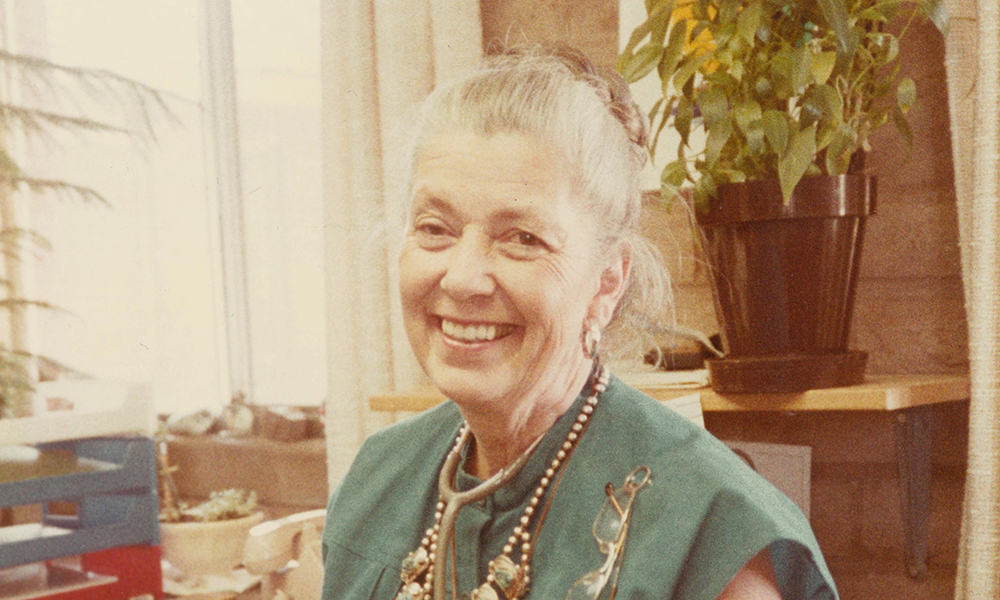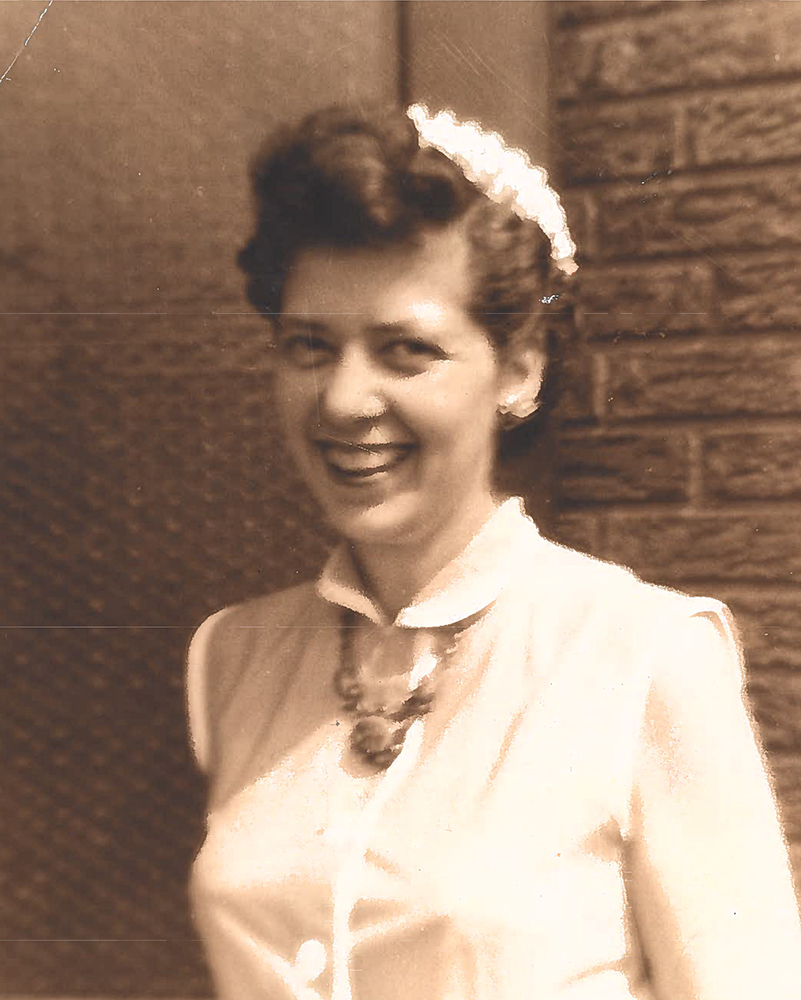
格拉迪斯·麥加里博士(Gladys McGarey)93歲時(shí),,在一個(gè)星期天的早晨從一個(gè)非常逼真的夢(mèng)中醒來。
她又回到了9歲,,住在印度叢林中的帳篷里(印度是她土生土長的地方),。在清晨的時(shí)候,她從帳篷里走出來,,調(diào)皮地看了看周圍,,看是否有人在看她。當(dāng)四下無人時(shí),,她以最快的速度跑了起來,,然后爬上了一棵芒果樹。一爬到樹頂,,她就開始唱歌,。歌詞記不清楚了,但麥加里知道歌詞的內(nèi)容非常有趣,。
現(xiàn)年102歲的麥加里在接受《財(cái)富》雜志采訪時(shí)表示:“我想唱什么老歌就唱什么老歌,,而且很開心?!彼貞浧鹱约鹤隽艘患煌瑢こ5氖隆?yàn)樵谒砷L的過程中,,禮拜天這天都要唱特定的圣歌,也要舉行家庭儀式,。但她一直在唱她自己喜歡的歌,。
“我在唱歌,在我醒來的同時(shí)我笑了起來,?!丙溂永镎f。
麥加里被稱為整體醫(yī)學(xué)之母,她是美國整體醫(yī)學(xué)委員會(huì)的聯(lián)合創(chuàng)始人,,并開了一家診所,,運(yùn)營時(shí)間長達(dá)60多年。她還撰寫了幾本關(guān)于治療和預(yù)防醫(yī)學(xué)科學(xué)的書籍,,如今還在繼續(xù)工作(作為一名咨詢醫(yī)生),,大約每周看診一次。
盡管她在事業(yè)上取得了成功,,但她并不覺得自己總是能夠表達(dá)清楚自己的想法,。
“直到93歲,我才真正找到自己的聲音,?!彼貞浾f,由于她有閱讀障礙,,她在小學(xué)時(shí)寫作業(yè)很吃力,,被稱為“班上的笨蛋”。
但她的夢(mèng)提醒她,,站在樹頂吶喊永遠(yuǎn)都不晚——或者就她的情況而言,,寫下人生的智慧永遠(yuǎn)都不晚。
在她100歲的時(shí)候,,她開始寫《充實(shí)的生活》(The Well-Lived Life),,這本書即將出版。在書中,,麥加里探討了如何尋找目標(biāo),,并分享了健康和幸福生活的六大秘訣。
以下是來自她充實(shí)生活的幾句至理名言,。
尋找目標(biāo)
作為一名精神矍鑠的百歲老人,,麥加里經(jīng)常回答有關(guān)她長壽秘訣的問題,。她的兒子開玩笑說,,他的母親至今仍有一個(gè)十年計(jì)劃。麥加里說,,她對(duì)學(xué)習(xí)和融入周圍世界的熱情要?dú)w功于她的使命感,。
目標(biāo)通常被定義為意圖,也是我們采取行動(dòng)背后的原因,。如果有什么東西能夠推動(dòng)我們前進(jìn),,我們會(huì)發(fā)現(xiàn)我們所做的事情更有意義——無論是一份職業(yè)、一套價(jià)值觀,、一個(gè)充滿激情的項(xiàng)目、有意義的人際關(guān)系,,還是一種生活方式,。
她說:“這就是找出你能做什么,,你的靈魂在告訴你什么。你必須這么做,?!?/p>
幸運(yùn)的是,尋找目標(biāo)并不需要花很多年時(shí)間,,而且這里所說的目標(biāo)不僅僅是一個(gè)要在待辦事項(xiàng)清單上打勾的目標(biāo),。它可以是讓你感覺自己活在當(dāng)下的日常活動(dòng),,也可以是當(dāng)我們放慢腳步時(shí)在工作之外找到的快樂時(shí)刻,。我們生活中的人際關(guān)系或副業(yè)可以給我們帶來興奮感。這個(gè)答案遠(yuǎn)沒有你們想的那么遙遠(yuǎn),。麥加里說,,這就是在感覺自己步入正軌時(shí)相信自己的直覺。
“尋找你能做的事情,,而不是你不能做的事情,。”她說,,這對(duì)每個(gè)人來說都不一樣,。“我們的身體是我們的老師……如果我們注意到它的存在,,我們就能學(xué)到東西,。”這是真的——當(dāng)我們從事我們喜歡的活動(dòng)時(shí),,我們的大腦會(huì)通過釋放多巴胺或滿足感來獎(jiǎng)勵(lì)我們,。
麥加里最近得知了她曾孫的油管(Youtube)頻道,令她驚訝的是,,該頻道已經(jīng)吸引了數(shù)千名粉絲,。這讓他很開心,麥加里說,,尋找任何能點(diǎn)亮你生命,,讓你熱血沸騰的東西——即使是“古怪的東西”。

麥加里說:“如果你認(rèn)為一切都已經(jīng)完成了,,人們已經(jīng)完成了所有需要做的事情或其他什么,你就不會(huì)找到目標(biāo),?!彼赡苁切疫\(yùn)的人之一,她一直都知道自己的目標(biāo)是當(dāng)好醫(yī)生,幫助患者康復(fù),。
然而,,在她的一生中,她也面臨著巨大的變化——無論這些變化是好是壞——這些變化改變了她的目標(biāo),,但也教會(huì)了她如何順應(yīng)潮流,。
愿意做出改變
麥加里一直將她母親的座右銘作為自己的行動(dòng)指南:將就。雖然這聽起來很簡單,,但也包含了幫助人們接受改變的手段,。
她說:“這是一種放下你當(dāng)下的所思所想,去到另一個(gè)地方,,并融入另一個(gè)地方的能力,。我認(rèn)為在地球上生活的所有人都會(huì)發(fā)現(xiàn)自己曾陷入僵局?!?/p>
作為六個(gè)孩子的母親,,麥加里說,當(dāng)出現(xiàn)變化時(shí),,很難不活在當(dāng)下,,也很難不去適應(yīng)這些變化。無論是她的孩子需要某樣?xùn)|西,,還是病人遇到緊急情況,,她都別無選擇,只能改變方向,。她無法面面俱到,,不得不接受她會(huì)讓他人失望,包括她的孩子,。
她說:“我知道,,有些時(shí)候當(dāng)他們希望我陪在他們身邊,但我卻無法陪在他們身邊時(shí),,他們會(huì)感到不安,。那又怎樣?我當(dāng)時(shí)的確無法陪在他們身邊,?!?/p>
她學(xué)會(huì)了接受自己的時(shí)間和注意力是有限的這一事實(shí)。
歡笑和傾聽
“生活,、歡笑,、愛”這陳腐的勵(lì)志口號(hào)對(duì)麥加里來說卻再真實(shí)不過了。她活著的目的就是因愛而笑,,因同情而傾聽,。她建議人們放慢腳步,,傾聽他人,并多開懷大笑,。
她說:“充滿愛意的笑是幸福和喜悅的,。帶著愛意去傾聽他人才更能理解他人?!?/p>
每天運(yùn)動(dòng)
麥加里每天走3800步(一步不差,她會(huì)在手機(jī)上追蹤自己的步數(shù)),。她經(jīng)常騎著她所謂的“成人三輪車”,,在院子里繞一圈,然后進(jìn)城,。
當(dāng)你喜歡某項(xiàng)活動(dòng)時(shí),,一直堅(jiān)持下來是大有裨益的——這是健身專家們的共識(shí)。
“我做我能做的事情和我想做的事情,?!丙溂永镎f。
關(guān)注夢(mèng)境,,并保證充足的睡眠
無論是比喻地還是事實(shí)上,,麥加里一生都在關(guān)注她的夢(mèng)境,并用它們來理清思緒,,保持動(dòng)力,。由于她能保證9個(gè)小時(shí)的睡眠時(shí)間,她在關(guān)燈后能捕捉到許多逼真的夢(mèng),。
能夠找到讓她興奮的東西有助于她追尋自己的目標(biāo),,并堅(jiān)持下來。
麥加里聽從了夢(mèng)境給的提示,,比如那個(gè)小女孩爬上芒果樹,,希望她的曲子能傳到有需要的人的耳朵里——就像她自己關(guān)于衰老和尋找快樂的信息可以傳給有需要的人一樣。(財(cái)富中文網(wǎng))
譯者:中慧言-王芳
格拉迪斯·麥加里博士(Gladys McGarey)93歲時(shí),,在一個(gè)星期天的早晨從一個(gè)非常逼真的夢(mèng)中醒來,。
她又回到了9歲,住在印度叢林中的帳篷里(印度是她土生土長的地方),。在清晨的時(shí)候,,她從帳篷里走出來,調(diào)皮地看了看周圍,,看是否有人在看她,。當(dāng)四下無人時(shí),她以最快的速度跑了起來,,然后爬上了一棵芒果樹,。一爬到樹頂,,她就開始唱歌。歌詞記不清楚了,,但麥加里知道歌詞的內(nèi)容非常有趣,。
現(xiàn)年102歲的麥加里在接受《財(cái)富》雜志采訪時(shí)表示:“我想唱什么老歌就唱什么老歌,而且很開心,?!彼貞浧鹱约鹤隽艘患煌瑢こ5氖隆?yàn)樵谒砷L的過程中,禮拜天這天都要唱特定的圣歌,,也要舉行家庭儀式,。但她一直在唱她自己喜歡的歌。
“我在唱歌,,在我醒來的同時(shí)我笑了起來,。”麥加里說,。
麥加里被稱為整體醫(yī)學(xué)之母,,她是美國整體醫(yī)學(xué)委員會(huì)的聯(lián)合創(chuàng)始人,并開了一家診所,,運(yùn)營時(shí)間長達(dá)60多年,。她還撰寫了幾本關(guān)于治療和預(yù)防醫(yī)學(xué)科學(xué)的書籍,如今還在繼續(xù)工作(作為一名咨詢醫(yī)生),,大約每周看診一次,。
盡管她在事業(yè)上取得了成功,但她并不覺得自己總是能夠表達(dá)清楚自己的想法,。
“直到93歲,,我才真正找到自己的聲音?!彼貞浾f,,由于她有閱讀障礙,她在小學(xué)時(shí)寫作業(yè)很吃力,,被稱為“班上的笨蛋”,。
但她的夢(mèng)提醒她,站在樹頂吶喊永遠(yuǎn)都不晚——或者就她的情況而言,,寫下人生的智慧永遠(yuǎn)都不晚,。
在她100歲的時(shí)候,她開始寫《充實(shí)的生活》(The Well-Lived Life),,這本書即將出版,。在書中,麥加里探討了如何尋找目標(biāo),,并分享了健康和幸福生活的六大秘訣,。
以下是來自她充實(shí)生活的幾句至理名言,。
尋找目標(biāo)
作為一名精神矍鑠的百歲老人,麥加里經(jīng)?;卮鹩嘘P(guān)她長壽秘訣的問題,。她的兒子開玩笑說,他的母親至今仍有一個(gè)十年計(jì)劃,。麥加里說,,她對(duì)學(xué)習(xí)和融入周圍世界的熱情要?dú)w功于她的使命感。
目標(biāo)通常被定義為意圖,,也是我們采取行動(dòng)背后的原因,。如果有什么東西能夠推動(dòng)我們前進(jìn),我們會(huì)發(fā)現(xiàn)我們所做的事情更有意義——無論是一份職業(yè),、一套價(jià)值觀、一個(gè)充滿激情的項(xiàng)目,、有意義的人際關(guān)系,,還是一種生活方式。
她說:“這就是找出你能做什么,,你的靈魂在告訴你什么,。你必須這么做?!?/p>
幸運(yùn)的是,,尋找目標(biāo)并不需要花很多年時(shí)間,而且這里所說的目標(biāo)不僅僅是一個(gè)要在待辦事項(xiàng)清單上打勾的目標(biāo),。它可以是讓你感覺自己活在當(dāng)下的日?;顒?dòng),也可以是當(dāng)我們放慢腳步時(shí)在工作之外找到的快樂時(shí)刻,。我們生活中的人際關(guān)系或副業(yè)可以給我們帶來興奮感,。這個(gè)答案遠(yuǎn)沒有你們想的那么遙遠(yuǎn)。麥加里說,,這就是在感覺自己步入正軌時(shí)相信自己的直覺,。
“尋找你能做的事情,而不是你不能做的事情,?!彼f,這對(duì)每個(gè)人來說都不一樣,?!拔覀兊纳眢w是我們的老師……如果我們注意到它的存在,我們就能學(xué)到東西,?!边@是真的——當(dāng)我們從事我們喜歡的活動(dòng)時(shí),,我們的大腦會(huì)通過釋放多巴胺或滿足感來獎(jiǎng)勵(lì)我們。
麥加里最近得知了她曾孫的油管(Youtube)頻道,,令她驚訝的是,,該頻道已經(jīng)吸引了數(shù)千名粉絲。這讓他很開心,,麥加里說,,尋找任何能點(diǎn)亮你生命,讓你熱血沸騰的東西——即使是“古怪的東西”,。
麥加里說:“如果你認(rèn)為一切都已經(jīng)完成了,,人們已經(jīng)完成了所有需要做的事情或其他什么,你就不會(huì)找到目標(biāo),?!彼赡苁切疫\(yùn)的人之一,她一直都知道自己的目標(biāo)是當(dāng)好醫(yī)生,,幫助患者康復(fù),。
然而,在她的一生中,,她也面臨著巨大的變化——無論這些變化是好是壞——這些變化改變了她的目標(biāo),,但也教會(huì)了她如何順應(yīng)潮流。
愿意做出改變
麥加里一直將她母親的座右銘作為自己的行動(dòng)指南:將就,。雖然這聽起來很簡單,,但也包含了幫助人們接受改變的手段。
她說:“這是一種放下你當(dāng)下的所思所想,,去到另一個(gè)地方,,并融入另一個(gè)地方的能力。我認(rèn)為在地球上生活的所有人都會(huì)發(fā)現(xiàn)自己曾陷入僵局,?!?/p>
作為六個(gè)孩子的母親,麥加里說,,當(dāng)出現(xiàn)變化時(shí),,很難不活在當(dāng)下,也很難不去適應(yīng)這些變化,。無論是她的孩子需要某樣?xùn)|西,,還是病人遇到緊急情況,她都別無選擇,,只能改變方向,。她無法面面俱到,不得不接受她會(huì)讓他人失望,,包括她的孩子,。
她說:“我知道,,有些時(shí)候當(dāng)他們希望我陪在他們身邊,但我卻無法陪在他們身邊時(shí),,他們會(huì)感到不安,。那又怎樣?我當(dāng)時(shí)的確無法陪在他們身邊,?!?/p>
她學(xué)會(huì)了接受自己的時(shí)間和注意力是有限的這一事實(shí)。
歡笑和傾聽
“生活,、歡笑,、愛”這陳腐的勵(lì)志口號(hào)對(duì)麥加里來說卻再真實(shí)不過了。她活著的目的就是因愛而笑,,因同情而傾聽,。她建議人們放慢腳步,傾聽他人,,并多開懷大笑,。
她說:“充滿愛意的笑是幸福和喜悅的。帶著愛意去傾聽他人才更能理解他人,。”
每天運(yùn)動(dòng)
麥加里每天走3800步(一步不差,,她會(huì)在手機(jī)上追蹤自己的步數(shù)),。她經(jīng)常騎著她所謂的“成人三輪車”,在院子里繞一圈,,然后進(jìn)城,。
當(dāng)你喜歡某項(xiàng)活動(dòng)時(shí),一直堅(jiān)持下來是大有裨益的——這是健身專家們的共識(shí),。
“我做我能做的事情和我想做的事情,。”麥加里說,。
關(guān)注夢(mèng)境,,并保證充足的睡眠
無論是比喻地還是事實(shí)上,麥加里一生都在關(guān)注她的夢(mèng)境,,并用它們來理清思緒,,保持動(dòng)力。由于她能保證9個(gè)小時(shí)的睡眠時(shí)間,,她在關(guān)燈后能捕捉到許多逼真的夢(mèng),。
能夠找到讓她興奮的東西有助于她追尋自己的目標(biāo),并堅(jiān)持下來,。
麥加里聽從了夢(mèng)境給的提示,,比如那個(gè)小女孩爬上芒果樹,,希望她的曲子能傳到有需要的人的耳朵里——就像她自己關(guān)于衰老和尋找快樂的信息可以傳給有需要的人一樣。(財(cái)富中文網(wǎng))
譯者:中慧言-王芳
When Dr. Gladys McGarey was 93, she awoke from a vivid dream one Sunday morning.
She was nine again, living in a tent in the jungle in India, where she grew up. She emerged from her tent in the early morning, looking mischievously to see if anyone was watching. When the coast was clear, she ran as fast as her legs allowed and climbed a mango tree. Once she got to the top, she sang. The song lyrics are hazy, but McGarey knew she was belting something fun.
“I’m singing any old thing that I want to sing, and having a great time,” McGarey, who is now 102, tells Fortune. She recalls doing something out of the ordinary—because Sundays growing up consisted of specific hymns and rituals with her family. But she kept singing her own favorites.
“I was singing, and I was laughing at the same time as I woke up,” McGarey says.
Called the mother of holistic medicine, McGarey co-founded the American Board of Holistic Medicine and ran a medical practice for over 60 years. She’s also authored a handful of books on the science of healing and preventative medicine and continues to work today as a consulting doctor seeing patients about once a week.
Despite her career success, she didn’t feel like she could always express herself.
“I didn’t really find my voice until I was 93,” she says, recalling how she struggled to write in elementary school and was called the “class dummy,” due to her dyslexia.
But her dream reminded her it’s never too late to shout from the tree tops—or in her case, write her wisdom from the heart.
At age 100, she began writing her forthcoming book, The Well-Lived Life. In it, McGarey explores how to find and cultivate purpose, and shares six secrets to health and happiness.
Here are a few words of wisdom from her well-lived life.
Find purpose
As an active centenarian, McGarey often fields questions about the secret to her longevity. Her son jokes about how his mother has a ten-year plan to this day. McGarey says her passion for learning and staying engaged with the world around her is thanks to her sense of purpose.
Conventionally defined as an intention, a purpose is the reason behind our actions. If something propels us forward, we find more meaning in what we do—whether a career, a set of values, a passion project, meaningful connections, or a way of life.
“It’s that kind of finding out what it is that you can do and what your soul is telling you,” she says. “You have got to do it.”
Fortunately, it doesn’t need to take years to find your purpose, and it’s not merely a goal to check off the to-do list. It can lie in everyday activities that make you feel present or the small moments of joy we find outside work when we slow down. The connections in our life or a side-hustle can bring us a sense of excitement. And the answer is closer than many would think. It’s about trusting your gut when something feels right, McGarey says.
“Look for what you can do, not what you can’t do,” she says, which looks different for everyone. “Our bodies are our teachers … if we pay attention to it, we learn lessons.” It’s true—when we engage in activities we enjoy, our brain rewards us with a release of dopamine or a rush of contentment.
McGarey recently learned about her great-grandson’s Youtube channel, which has amassed thousands of subscribers to her amazement. It makes him happy, and McGarey says to search for whatever lights your candle, and gets the juices flowing—even if it’s “wackadoodle.”
“If you’re thinking that everything is done, that people have done everything that needs to be done or whatever, you won’t find it,” McGarey says, who may be one of the lucky ones having always known her purpose was to help people through the healing process as a physician.
However, she also faced immense change throughout her life—both for better and for worse—which changed her purpose, but taught her how to move with the tide.
Be willing to pivot
McGarey lives by her mother’s motto: make do. While simple at the outset, it holds the tools to help people accept pivots.
“It’s that kind of ability to drop what you are thinking and move to the other place and be there at that other place,” she says. “I don’t think there are any people who have traveled this earth who haven’t found themselves in places when they’ve been stuck for a while.”
As a mother of six, McGarey says it was hard not to be in the moment and make do when changes arose. Whether it was something her kids needed or if a patient faced an emergency at work, she had no choice but to change course. She couldn’t do it all and had to accept she would disappoint people along the way, including her children.
“I know there were times when they were upset about me not being there when they would want me to be there,” she says. “But so what? I wasn’t.”
She learned to accept that her time and attention is limited.
Laugh and listen
The cliche motivational slogan “l(fā)ive, laugh, love,” rings true for McGarey. She has led a life aimed at laughing out of love, and listening out of empathy. She advises people to slow down, listen to others, and laugh more.
“Laughter with love is happiness and joy,” she says. “Listening with love is understanding.”
Move every day
The author walks a precise 3,800 steps a day, which she tracks on her phone. She routinely rides her “adult tricycle,” as she calls it, around her yard and into town.
Maintaining a consistent movement routine helps when you enjoy the activity—something fitness experts agree on.
“I do things that I can do, that I want to do,” McGarey says.
Pay attention to dreams and get enough sleep
Both figuratively and literally, McGarey has paid attention to her dreams throughout her life and used them to calm her brain and stay motivated. Thanks to her nine hours of sleep, she catches many vivid dreams when the lights turn off.
And being able to find something that excites her has helped her chase and follow a purpose.
McGarey listens to the cues from her dreams, such as that little girl climbing up the mango tree, in hopes of her tune landing on the ears of someone who needs to hear it—much like her own message about aging and finding joy.






